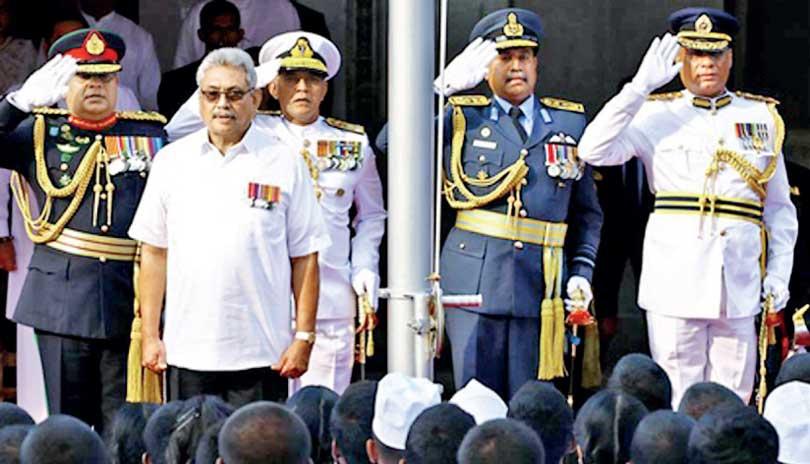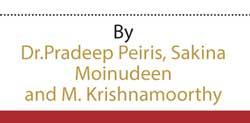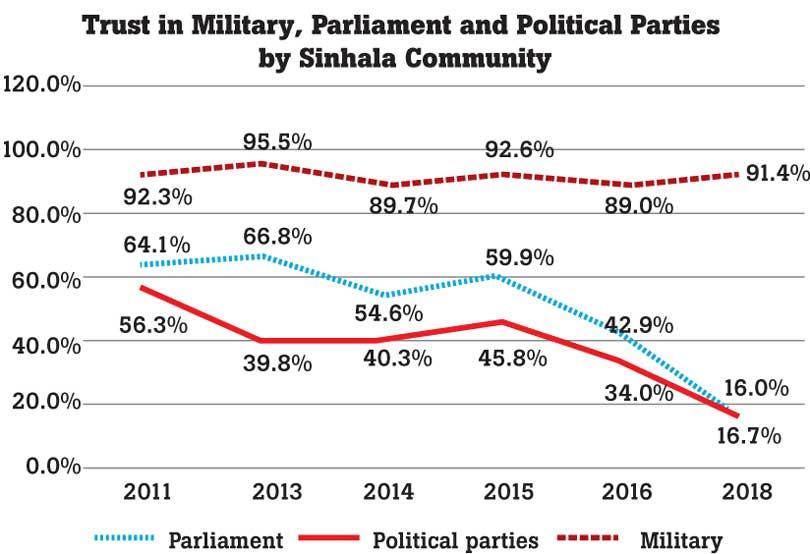16 Jun 2020 - {{hitsCtrl.values.hits}}

 Finally, the date of the Parliamentary elections has been announced. There is hardly any doubt about which party would win the election. The only doubt is which ideology of the SLPP coalition would emerge to determine the country’s political destiny. The President and his supporters endorse an authoritarian style rule, while others in the coalition seem to prefer the familiar clientelist electoral politics. While decades of profound disappointment with traditional politics may make authoritarian style rule seem appealing, this article attempts to argue that authoritarianism of any form is not a wise replacement for Sri Lanka’s wounded democracy.
Finally, the date of the Parliamentary elections has been announced. There is hardly any doubt about which party would win the election. The only doubt is which ideology of the SLPP coalition would emerge to determine the country’s political destiny. The President and his supporters endorse an authoritarian style rule, while others in the coalition seem to prefer the familiar clientelist electoral politics. While decades of profound disappointment with traditional politics may make authoritarian style rule seem appealing, this article attempts to argue that authoritarianism of any form is not a wise replacement for Sri Lanka’s wounded democracy.
Society’s discontent with democratic rule
For years, many public opinion polls have suggested increasing public discontent with the country’s democracy and democratic institutions. For example, the State of Democracy in South Asia Survey conducted by the Social Scientists’ Association in 2012 revealed that 24.4% of Sinhalese in the country preferred a strong leader, with 91.1% of them opting for a leader elected through a free and fair election. This preference for a ‘strong leader’ further intensified during the last two years of the Yahapalana government, against a backdrop of extremely chaotic governance. Social Indicator, the survey research arm of the Centre for Policy Alternatives data shows that in 2018, 52.1% of the Sinhalese community preferred ‘rule of a strong leader’, while another 52.7% preferred ‘rule of an expert’, and 80.9% preferred the ‘rule of an elected leader’. Therefore, poll results clearly indicated that the majority of the Sinhalese community preferred the rule of an elected leader who can also be recognised as a strong leader, as well as an expert. This greater preference for strong leaders and experts – a Singaporean style democracy – is inversely correlated to the declining of public trust in Parliament and political parties. According to the polling series conducted by Social Indicator, the level of trust in Parliament and politicians by the Sinhalese community has steadily declined over the period during 2011-2018, while trust in the military remained high and static.

Political economy of the support towards current authoritarianism
The current impetus for an authoritarian style democracy has its own political economy. There are groups within the new elite circles who are destined to benefit from such a form of government. On the one hand, the emergent military class that enjoys significant wealth and status is a result of the three-decade war. On the other, the neoliberal service based-economy over the past thirty years has produced another new class, a class comprising professionals – doctors, engineers, accountants, managers, etc. - and bureaucrats. They also have emerged as a class that possesses a great deal of wealth and status in the country. Interestingly, both these groups come from a similar social and cultural background - outside of Colombo and are chiefly from the Sinhala-Buddhist community. Therefore, the majority among these new classes sympathises with the ethos of Sinhala-Buddhist nationalism and the values of neoliberalism. Especially since 2010, it has become apparent that these new elites are no longer satisfied with their new found wealth and status, and desire political power. Unlike traditional politicians, both these aspiring military elites and professionals do not have their own constituencies that are built on dynastic and/or patronage politics. In this context, Gotabaya Rajapaksa’s vision of authoritarian style democracy would suite these new elites perfectly, as it affords them relatively easy access to the extremely competitive parliamentary politics. As to why the majority of professional, military, and bureaucratic classes are rallying around the vision of the President to transform our society to an authoritarian democracy, may thus be explained.
Conditions are ripe for authoritarian democracy
The President, unlike many of his political peers, has been fairly transparent about his preferred form of government, even before his election to the presidential office. In fact, his electoral platform was articulated precisely on these terms, where he appealed to those in need of a ‘tough leader’ who does not hesitate to bend or forgo norms and rules to deliver development and ensure security. An Executive President who has risen to power from outside of traditional political party institutions, and who genuinely believes that Sri Lanka needs authoritarian style rule, caters perfectly to these expectations. His conviction that the military and professional classes have the best skills to deliver development and security is vindicated by the poor record of ostensibly more democratic governments that preceded him.
Furthermore, unlike in the past, there won’t be much criticism from the international community for sliding towards soft authoritarianism, as there are many leaders in the free world who demonstrate great sympathy for such right-wing ideology. The current COVID-19 pandemic would make it even easier for the ruling class to advocate an authoritarian style government. Therefore, we should anticipate further deterioration of the democratic character of government, unless people from all walks of life come together to resist it. Frustration with the experience of 70 years of democratic governance is reasonable, but that should not justify tolerance towards authoritarian style rule.
Myths of authoritarianism
As there are many myths associated with democracy, authoritarianism is also propagated and justified on many myths. As nationalism, authoritarianism also thrives on fear. People tend to believe that authoritarian rule would ensure security. In the wake of the Easter attacks, democratic governance was lampooned by Sinhala nationalist politicians who instead advocated strong arm rule. Of course, contemporary world politics furnishes enough evidence that even authoritarian states are not immune to terrorist attacks. Additionally, there are ample examples for cases where democracies show greater ability to successfully tackle internal as well as external threats. Unlike a few decades ago, today, majority of the world’s states face threats from within their own societies than from outside. Discrimination or exclusion of certain groups in the governance process always makes states vulnerable to rebellion from within. Consolidating political powers in the hands of a few, and blocking space for consultation and forming consensus, and rule by a group of experts who are not accountable to citizens will surely lead to public discontent, and later political instability. Therefore, authoritarian style regimes by design are prone to instability, arguably more so than democratic regimes.
The rise of China’s economy and the impressive development of Singapore constitute the most famous validation for authoritarian style rule. In the 1980s, President JR Jayewardene also promised the ‘Singaporean dream’ to garner public support when he turned to authoritarian style rule. We hear the chanting of the same mantra today in justifying the authoritarian ambitions of the current rulers. It is true that sometimes authoritarian rule makes the execution of development projects much easier and smoother, as under such rule policy making and execution do not require majority consensus or consultation with numerous groups. However, development projects without accountability would lead to colossal levels of corruption and nepotism. At least in liberal democracies, media and other interested groups could reveal the corruption of rulers and people can protest against such wrong doing. Under authoritarianism, small groups would benefit out of large-scale corruption, and there won’t be any peaceful means to counter such ill governance. Therefore, authoritarian rule does not necessarily ensure development.
Another myth is that employing military officials in civilian affairs would bring discipline and order to our society. The recently appointed Presidential Task Force comprises many military officers, and qualities like discipline, order, and virtue that they try to inculcate need serious critical analysis. This is particularly so in light of various exceptions made by the government, one illustration being the Arumugam Thondaman’s funeral, despite its claims to uniformity, discipline, and order.
It is only the immaturity of the social rationale, and nostalgia for old tribalism that prompts the preference for authoritarian style rule to remedy the drawbacks of Sri Lankan democracy. We all know that democracy cannot ever be perfect. Of course, democracies have produced inefficient and corrupt leaders and leaders who lead countries to wars, and paved the way for clowns to rule. However, democracy is the only system of rule where the ruled can send their rulers home peacefully. Therefore, remedy for the country’s wounded democracy is not turning into an authoritarian style rule, but rather encourage intense citizen engagement to renegotiate the contract between the citizen and the state.
26 Dec 2024 23 minute ago
26 Dec 2024 45 minute ago
26 Dec 2024 3 hours ago
26 Dec 2024 4 hours ago
26 Dec 2024 6 hours ago